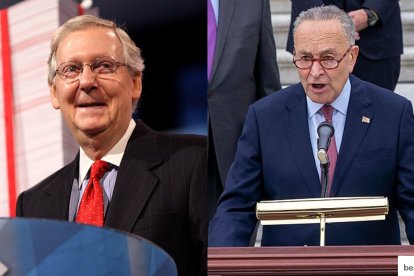The Senate begins to debate the National Defense Authorization Act
The legislation has already received the approval of the House of Representatives and landed on Wednesday in the Upper House, where both parties are expected to negotiate on the last amendments introduced by conservative congressmen.

Mitch McConnell-Chcuk Schumer/Wikimedia Commons
The Senate received the National Defense Authorization Act (NDAA) on Wednesday. The legislation passed the House of Representatives and must now clear this final legislative hurdle to reach President Joe Biden's desk. The road will not be easy because House conservatives introduced amendments in the text that are unpopular in the Democratic caucus.
The legislation passed the House last Friday with 219 votes in favor and 210 against. Kevin McCarthy secured the necessary votes at the last minute after negotiating terms and conditions with the House Freedom Caucus.
The bill cleared the first hurdle in the Senate on Tuesday when it passed the procedural vote by 72-25, allowing it to enter the full Senate. Once inside, legislators were quick to propose their respective amendments.
On Wednesday alone, 51 non-controversial amendments were introduced, 21 of which were Democratic, 21 Republican and the remaining nine resulted from bipartisanship efforts.
As for the most contentious points of the legislation, the leadership plans to resolve them behind closed doors. Chuck Schumer (D-NY) and Mitch McConnell (R-KY) will try to reach an agreement to vote on the most controversial proposals in a private meeting.
One of the main issues to be discussed is expected to be the Pentagon's policy of reimbursing travel expenses for service members who cross state lines for abortions. Tommy Turberville (R-AL) has been withholding promotions and important military posts for months to force a change in this regard.
What does the NDAA say?
Specifically, the National Defense Authorization Act would authorize $874.2 billion in national defense spending, including $841.5 billion for the Department of Defense and $32.2 billion for national security programs within the Department of Energy. In addition, it would provide a 5.2% pay increase for the military.
Perhaps the most problematic sections of the legislation are the amendments added by House conservatives as part of a deal with the speaker to vote for the bill. However, with the Senate needing to reach the 60-vote threshold, there is every reason to believe that the text will be modified.
The aforementioned Republican amendments would rescind the Pentagon program that reimburses service members who must travel for reproductive health care, would limit access to gender-affirming care for transgender troops, and would put an end to several diversity, equity and inclusion initiatives at the Department of Defense.
RECOMMENDATION





















